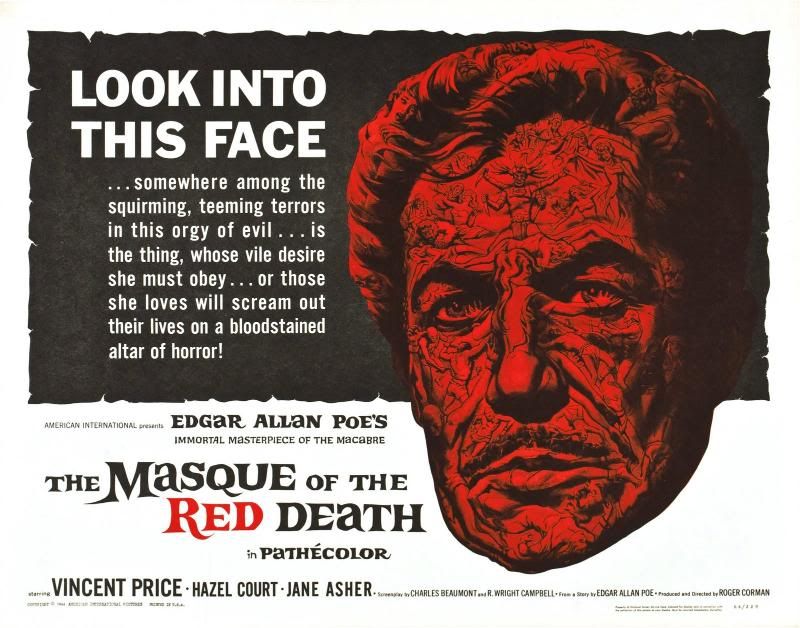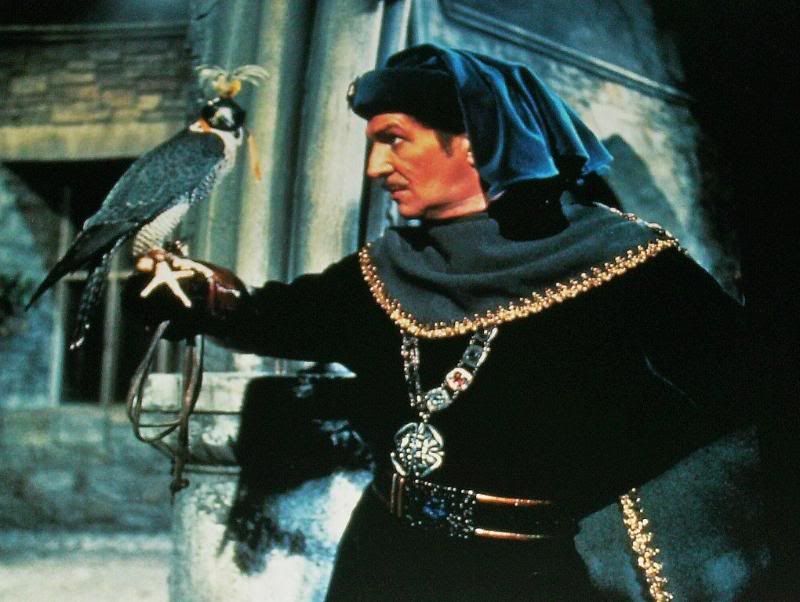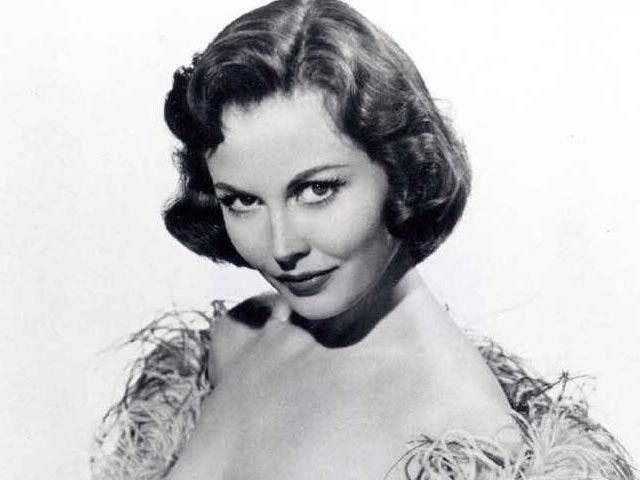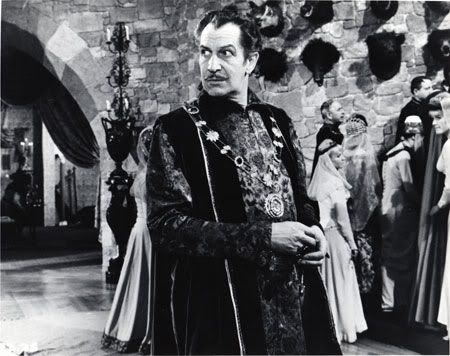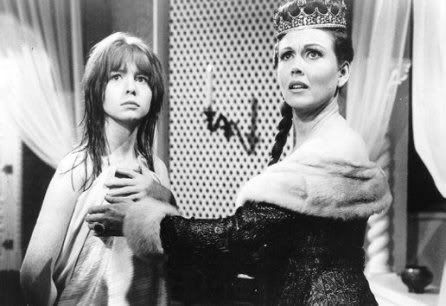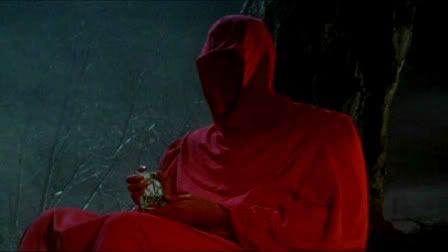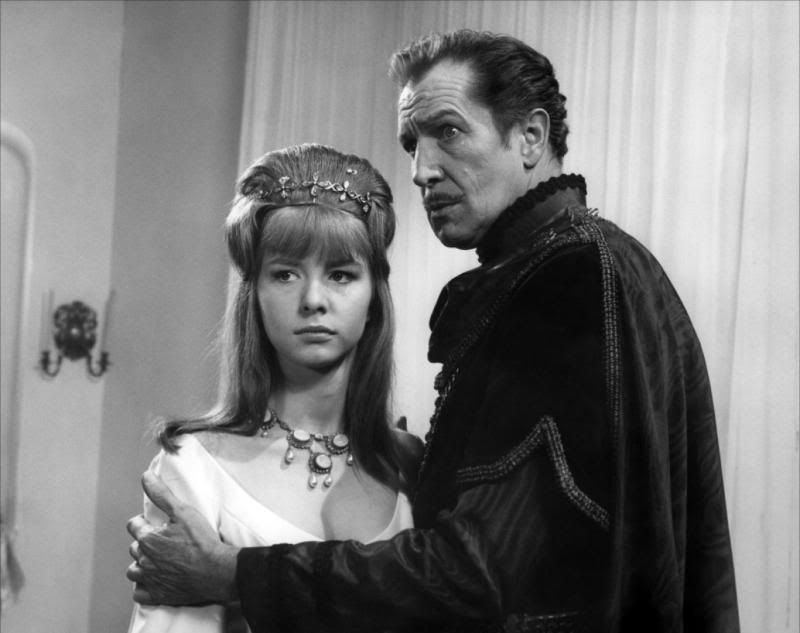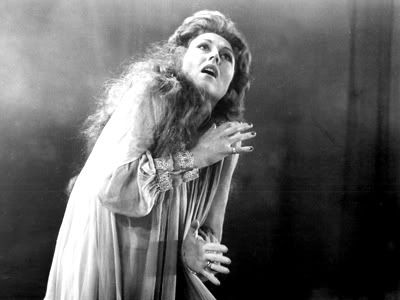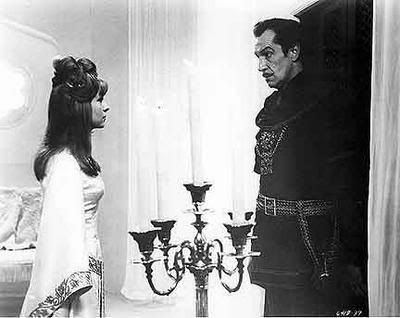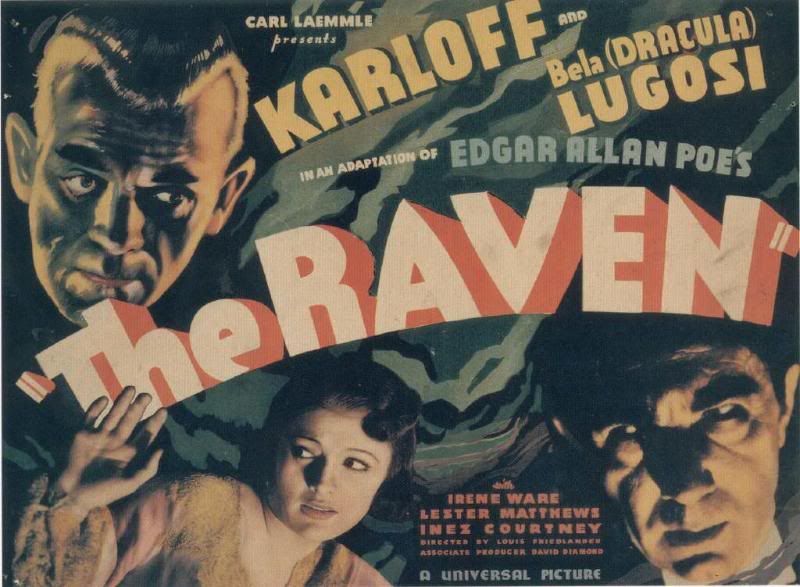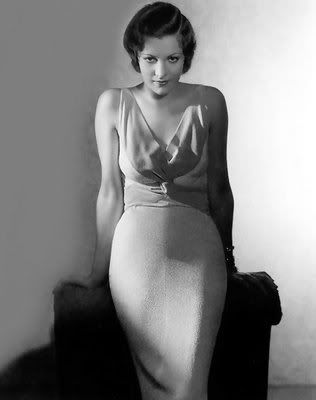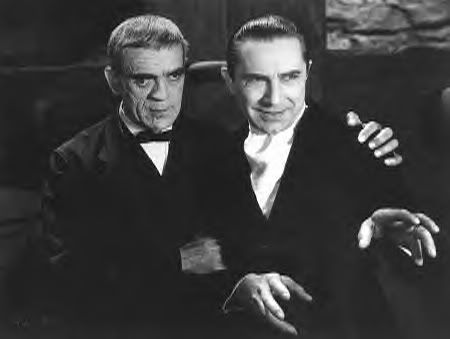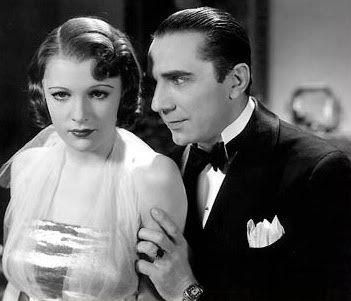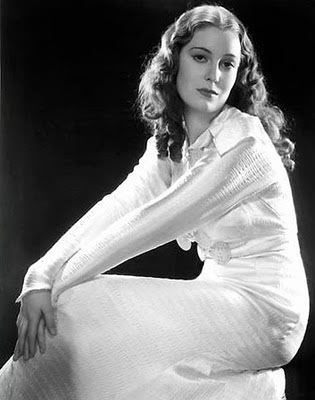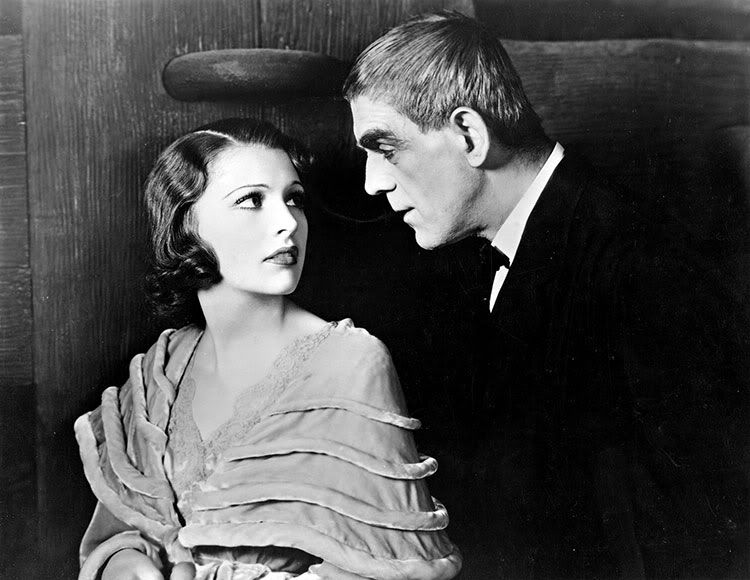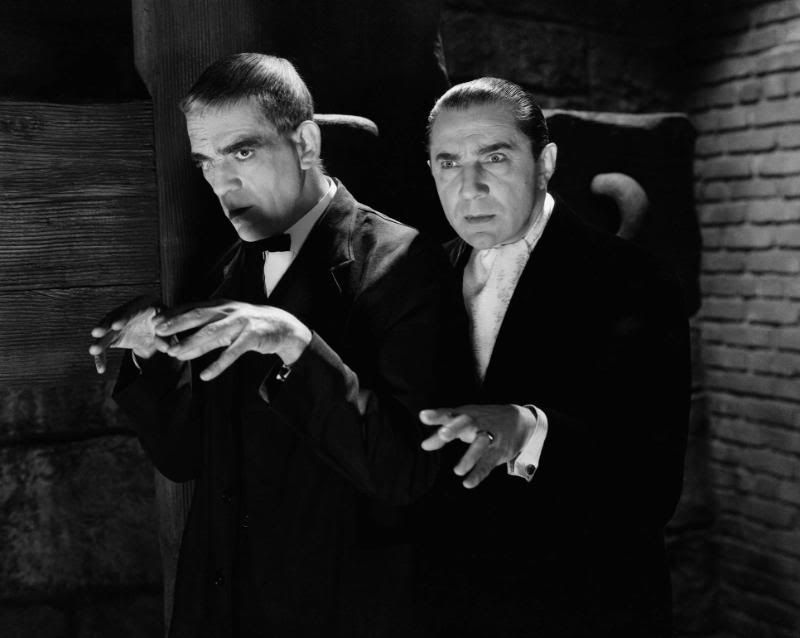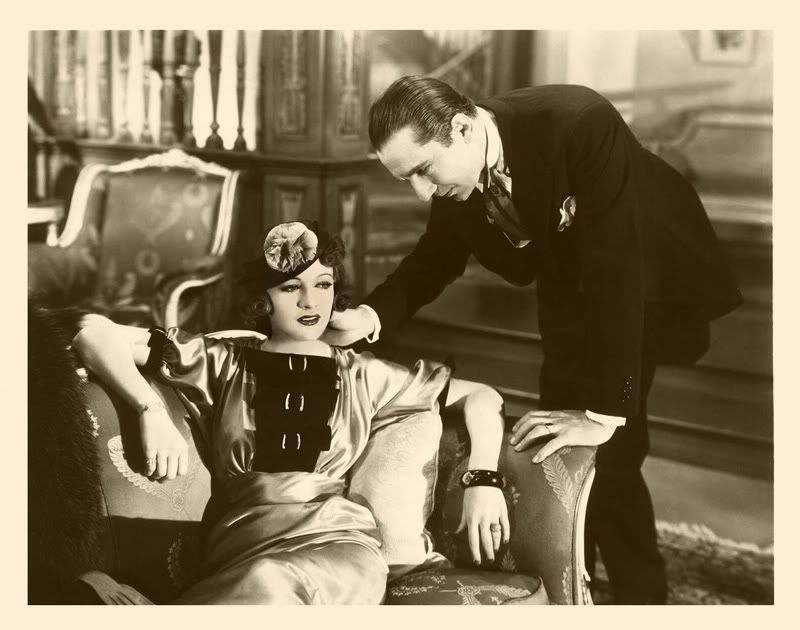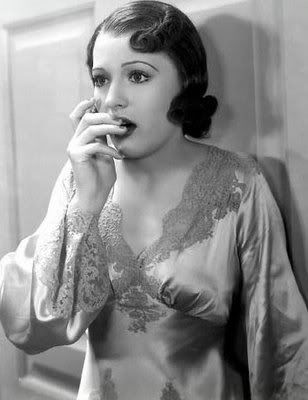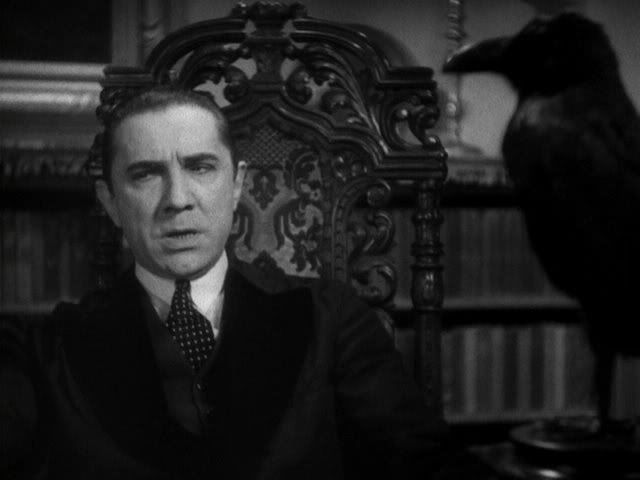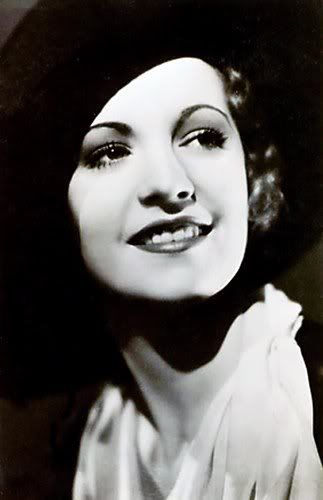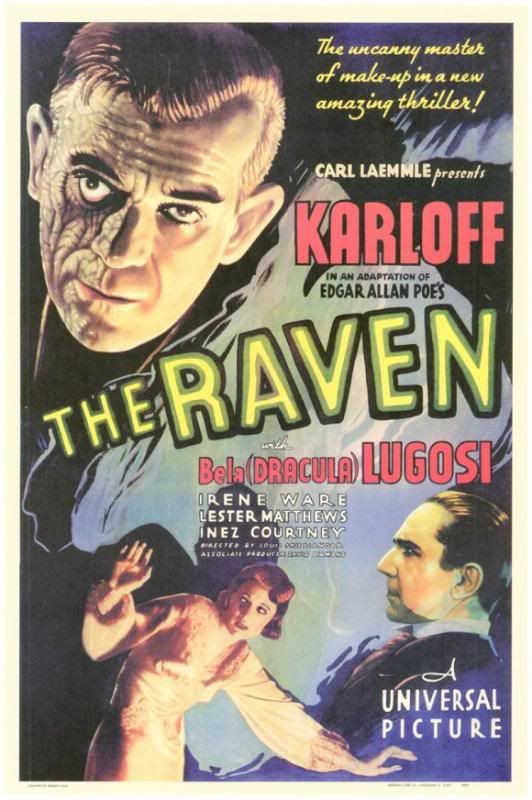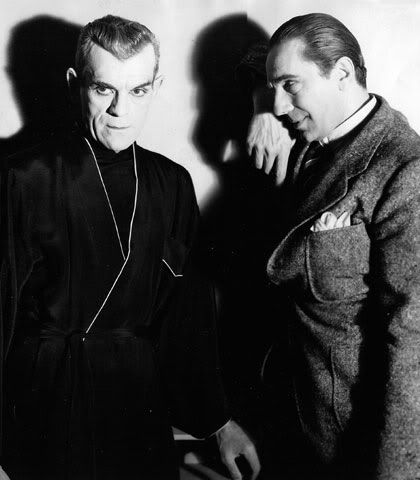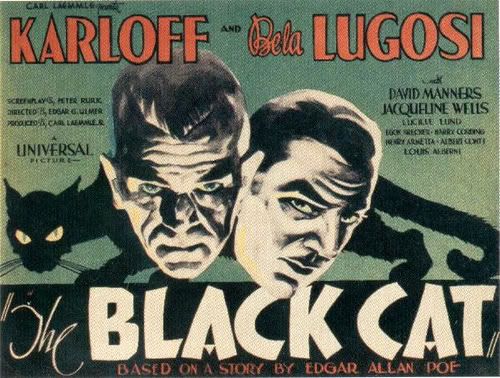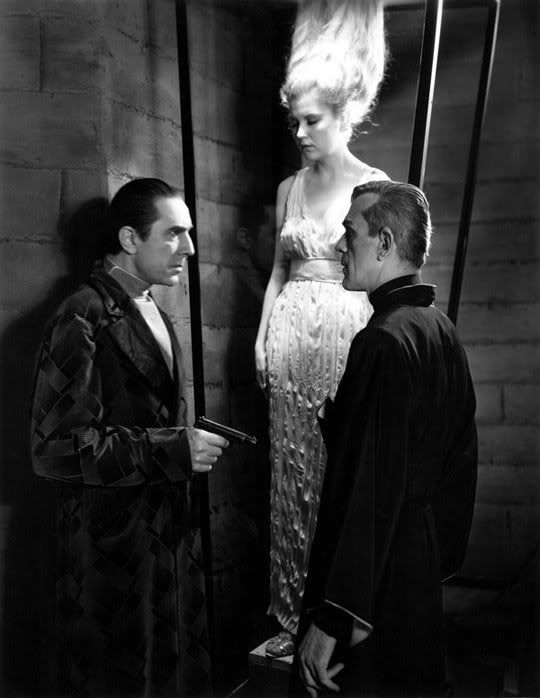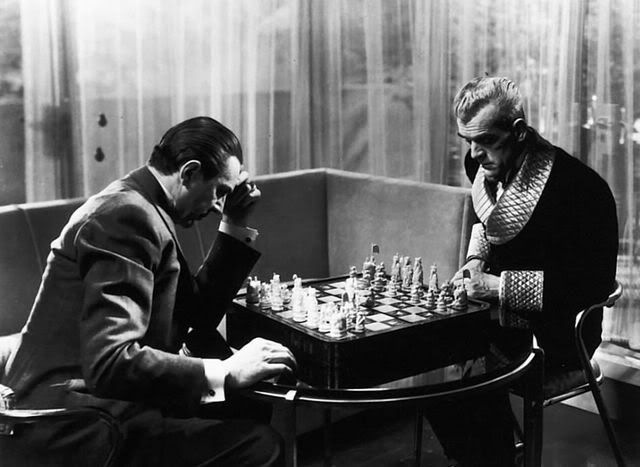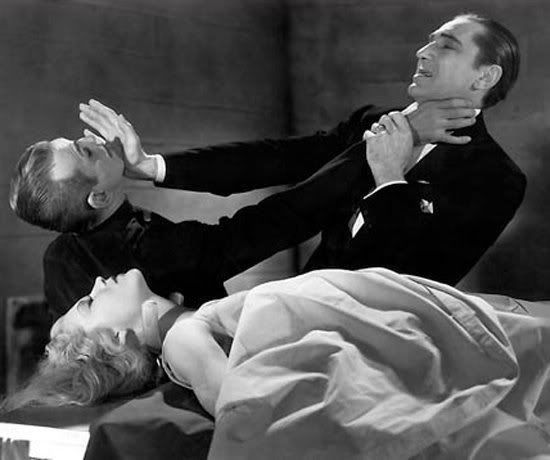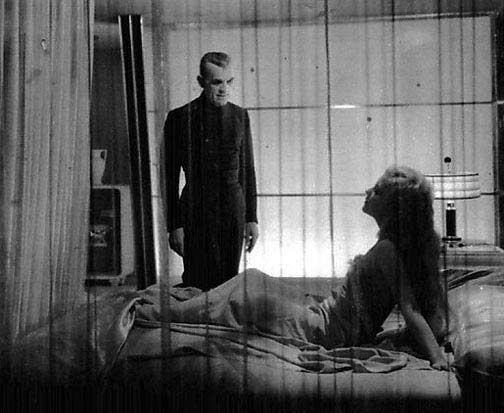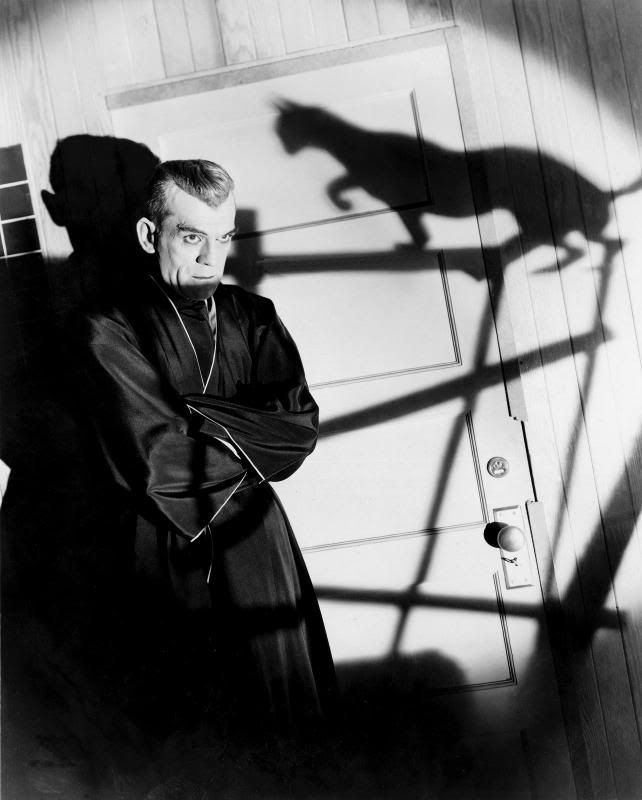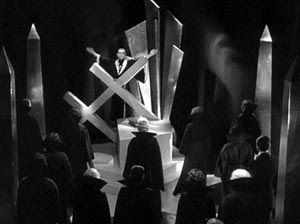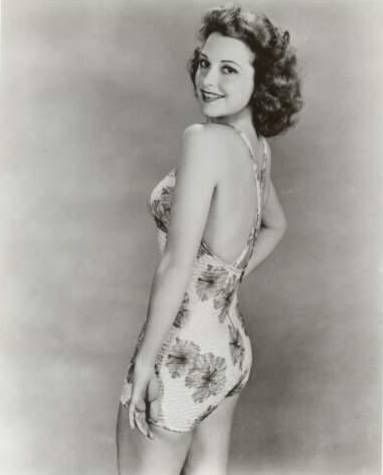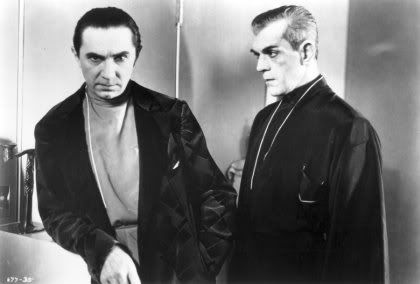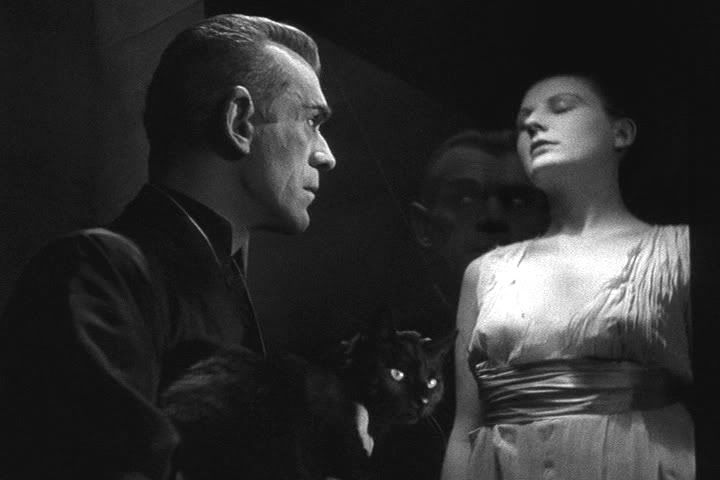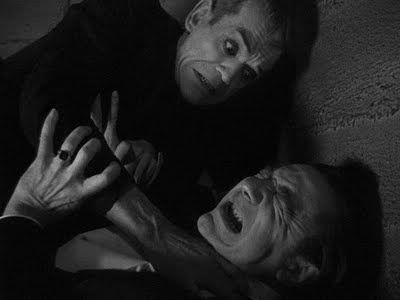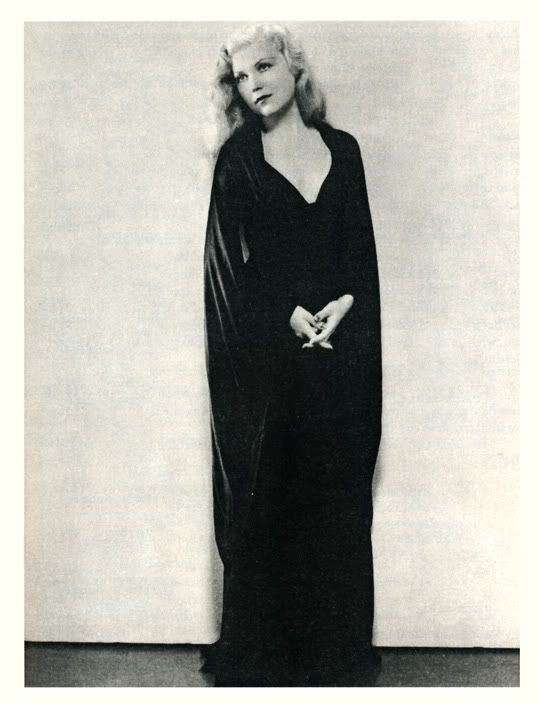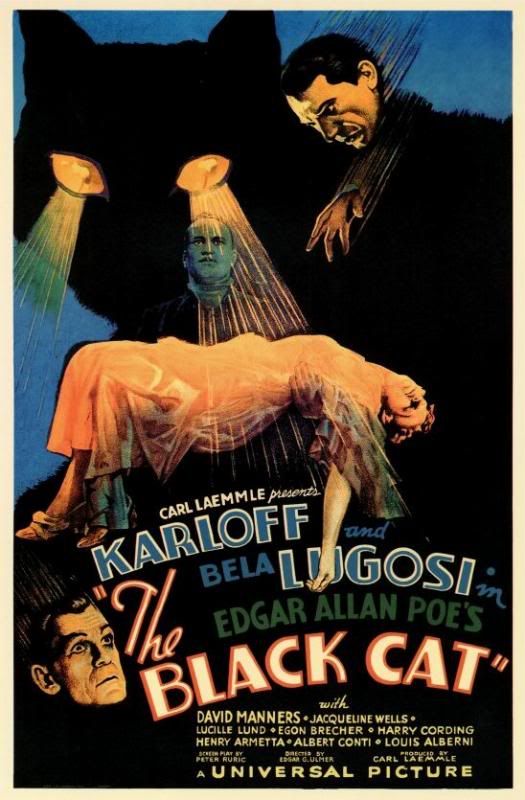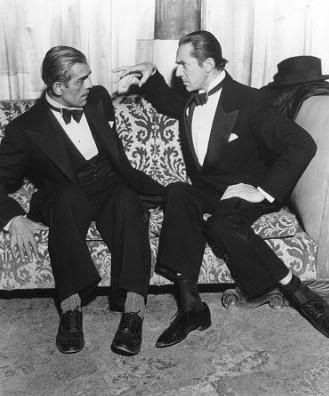Showing posts with label Poe. Show all posts
Showing posts with label Poe. Show all posts
Saturday, October 30, 2010
31 Days of Halloween: The Masque of the Red Death
We revisit loose Poe adaptations today with producer/director Roger Corman's The Masque of the Red Death. This 1964 Vincent Price vehicle was filmed on the standing sets from Becket, the recently-completed film adaptation of the play of the same name. Hence, Masque has sets far beyond the usually meager Corman budgets would provide.
Prince Prospero(Price), an oppressive tyrant, holes up in his castle with dozens of friends and sycophants while the Red Death ravages the countryside. Peasant girl Francesca(Jane Asher), her lover Gino(David Weston), and her father Ludovico(Nigel Green) are drawn into Prospero's debauchery. As Prospero's schemes unfold, his mistress Juliana(Hazel Court), his "friend" Alfredo(Patrick Magee), and his jester Hop Toad(Skip Martin) all plot against him. Meanwhile, the mysterious Man In Red lurks behind the scenes...
Vincent Price brings a charming, oily menace to Prospero that no one else could have managed. Like Karloff, Price's villains often had a sympathetic side that allowed us to relate to them on some level. Prospero is vile and despicable through and through, an absolutely rotten bastard any way you look at him. It's nice to see Price really cut loose with a truly evil character.
The rest of the cast is competent, with a few standouts in the form of Hazel Court and Jane Asher. Asher reportedly brought her boyfriend Paul by the set, where he met Corman and some of the cast and crew. They were surprised when they discovered that Paul was part of an obscure rock group called the Beatles; perhaps a few of you hardcore music historians have heard of them.
The Masque of the Red Death is only one of eight Poe adaptations Corman was responsible for, and it's among the very best. These films represent the high point of Corman's filmmaking career in the minds of many people; for the most part, they've aged well, and remain entertaining on their own merits to this day. For fans of Vincent Price, The Masque of the Red Death displays the actor in one of his most satisfying villainous roles. Unfortunately, the film appears to be currently unavailable on DVD, aside from some overpriced secondhand copies. The film appears regularly on TV, though, so keep an eye out for it. It's worth the trouble.
Monday, October 18, 2010
31 Days of Halloween: The Raven (1935)
We're revisiting liberal adaptations of Edgar Allen Poe today, with 1935's The Raven!
The second film to team top horror icons Bela Lugosi and Boris Karloff, The Raven revolves around the brilliant and vain Dr. Vollin(Lugosi). Vollin is obsessed with Poe, and has built working replicas of the many torture devices featured in Poe's stories. Judge Thatcher(Samuel S. Hiunds)'s daughter Jean(Irene Ware) has been involved in a bad car accident, and the Judge appeals to Dr. vollin for help. Vollin refuses at first, claiming he is retired, but eventually agrees after much flattery.
As Jean recovers, Vollin realizes he is strongly attracted to her. Her father and her fiancee Jerry(Lester Matthews) see that she is becoming infatuated to Vollin as well, and seek to prevent it. Vollin's carefully ordered world is rocked by these events, and when an escaped convict(Karloff) appeals to him for help, Vollin uses him to put his plans for revenge in motion. Vollin is determined to restore order to his world, no matter how many lives he must ruin!
Lugosi is amazing as Dr. Vollin. This is easily one of his finest performances, and those who think that Bela basically played Dracula over and over again should see this movie, and prepare to be proved wrong. Vollin is completely amoral, a self-described god "with the taint of human emotion," and "a law unto [himself]." It's very telling that Vollin agrees to operate to save Jean's live not out of compassion or adherence to his Hippocratic oath, but because all of his colleagues concede that he is the only man who can do it. Vollin is driven by ego and vanity, and cares only for himself, no matter the circumstances. There are plenty of scenes that allow Bela to cut loose with comic book grandeur, as well as many moments of sinister subtlety.
Karloff isn't given nearly as much screen time as Lugosi, but he does quite well with the character of Bateman. As Vollin's unwilling henchman, Karloff is quite menacing, and still brings the patented Karloff humanity to the portrayal. It's not one of Karloff's greatest performances, but it is a good, meaty supporting role.
The rest of the cast is good overall, and the standout is Irene Ware as Jean. Of all the women menaced by Bela Lugosi in his films, she surely ranks in the top five!
The Raven was the last straw for the censors in England, who placed a temporary ban on horror films that served as a precursor to the "permanent" ban that followed shortly thereafter. The scenes of torture incensed thew prudish censors, and the film box office take suffered as it was pulled from circulation in many markets. Ultimately, the film was one more step toward the end of the first cycle of horror films.
The Raven is generally not as well known as other films featuring Lugosi and Karloff, but it deserves to be. It is easily one of the very best films that Bela was ever in, and provides an excellent showcase for him at the peak of his abilities. The Raven is a fun movie for Karloff devotees, but for fans of Lugosi, it is absolutely indispensable.
The second film to team top horror icons Bela Lugosi and Boris Karloff, The Raven revolves around the brilliant and vain Dr. Vollin(Lugosi). Vollin is obsessed with Poe, and has built working replicas of the many torture devices featured in Poe's stories. Judge Thatcher(Samuel S. Hiunds)'s daughter Jean(Irene Ware) has been involved in a bad car accident, and the Judge appeals to Dr. vollin for help. Vollin refuses at first, claiming he is retired, but eventually agrees after much flattery.
As Jean recovers, Vollin realizes he is strongly attracted to her. Her father and her fiancee Jerry(Lester Matthews) see that she is becoming infatuated to Vollin as well, and seek to prevent it. Vollin's carefully ordered world is rocked by these events, and when an escaped convict(Karloff) appeals to him for help, Vollin uses him to put his plans for revenge in motion. Vollin is determined to restore order to his world, no matter how many lives he must ruin!
Lugosi is amazing as Dr. Vollin. This is easily one of his finest performances, and those who think that Bela basically played Dracula over and over again should see this movie, and prepare to be proved wrong. Vollin is completely amoral, a self-described god "with the taint of human emotion," and "a law unto [himself]." It's very telling that Vollin agrees to operate to save Jean's live not out of compassion or adherence to his Hippocratic oath, but because all of his colleagues concede that he is the only man who can do it. Vollin is driven by ego and vanity, and cares only for himself, no matter the circumstances. There are plenty of scenes that allow Bela to cut loose with comic book grandeur, as well as many moments of sinister subtlety.
Karloff isn't given nearly as much screen time as Lugosi, but he does quite well with the character of Bateman. As Vollin's unwilling henchman, Karloff is quite menacing, and still brings the patented Karloff humanity to the portrayal. It's not one of Karloff's greatest performances, but it is a good, meaty supporting role.
The rest of the cast is good overall, and the standout is Irene Ware as Jean. Of all the women menaced by Bela Lugosi in his films, she surely ranks in the top five!
The Raven was the last straw for the censors in England, who placed a temporary ban on horror films that served as a precursor to the "permanent" ban that followed shortly thereafter. The scenes of torture incensed thew prudish censors, and the film box office take suffered as it was pulled from circulation in many markets. Ultimately, the film was one more step toward the end of the first cycle of horror films.
The Raven is generally not as well known as other films featuring Lugosi and Karloff, but it deserves to be. It is easily one of the very best films that Bela was ever in, and provides an excellent showcase for him at the peak of his abilities. The Raven is a fun movie for Karloff devotees, but for fans of Lugosi, it is absolutely indispensable.
Sunday, October 10, 2010
31 Days of Halloween: The Black Cat (1934)
Edgar Allan Poe created a body of work that has fired the imaginations of readers for nearly two centuries. It was inevitable that filmmakers would mine his stories for ideas, and it has been going on almost continuously since the '30s, in film and, later, on television. A rare few of these adaptations have captured the essence of Poe's work, remaining remarkably faithful to his stories. The Black Cat is not one of these.
That's not a condemnation, though; The Black Cat is a great movie. It was the first film to pair top horror stars Bela Lugosi and Boris Karloff, and represents their finest collaboration. (Some may argue that The Raven is better, but their roles are simply not equal in that film. As far as the pairing of the two icons, The Black Cat presents them both in the most equal roles the two would ever have in the same film.)
Filmed in 1934 by writer/director Edgar G. Ulmer, the film is a marvel of efficient, low-budget filmmaking. With a budget of only $91,125(the film did wind up going slightly over budget, but was still relatively dirt cheap), the film became Universal's biggest moneymaker of 1934, a smash hit with the public. (Demonstrating once more how Bela was routinely disrespected by Universal, he was paid $1,000 per week, with a three-week guarantee. Karloff was paid a flat $7500, and even David Manners, who plays writer Peter Alison, got $1,250 per week! This mistreatment persisted, despite Bela's tremendous appeal as a box office draw.)
Newlyweds Peter(Manners) and Joan Alison(Julie Bishop, billed here as Jaqueline Wells) are honeymooning in Hungary when, by a twist of fate, they fall in with Vitus Werdegast(Bela). Vitus is on his way to exact revenge on his former friend, Hjalmer Poelzig(Karloff), who betrayed Vitus in the past. A series of events conspire to force the three of them to stay at Poelzig's house, where things quickly escalate.
Ulmer brought a fantastic Bauhaus sensibility to the set design, which helps lend the film its unique look. The use of lighting in the film hearkens back to German expressionist films, something that Ulmer had on his resume. Lovely cinematogropahy and an excellent classical score compiled by Heinz Eric Roemheld complete the mood. A few of the classical pieces heard in the film may seem a bit cliched today, but they certainly weren't at the time.
One of the most interesting aspects of The Black Cat is how we get to see both Karloff and Lugosi play against type. Karloff portrays the thoroughly evil villain with no redeeming qualities, while Lugosi is the more "normal," sympathetic protagonist in the film(although that wasn't the case before some changes were made during re-shooting). Each man normally played the other sort of part, and it's refreshing to see them get to flex their acting muscles a bit more than they had the opportunity to do in numerous other films.
Despite the film's success, Ulmer's career was doomed. He had been having an affair with Shirley Alexander, the wife of Max Alexander-- Carl Laemmle's nephew. Ulmer was virtually blackballed from the major studios after that, spending the rest of his career making low-budget schlock such as The Man From Planet X and The Amazing Transparent Man.
The Black Cat is stylish, subversive, and loaded with symbolism. It draws from occultism, German expressionism, innovative architectural design, and World War I and mixes them into something unique in the annals of classic horror. Its historic first-time pairing of horror's greatest icons is only one reason I recommend it so highly. It's one of the best films of the '30s. Watch it now. Then, watch it again, to pick up all the things you missed the first time through. It's one of those rare movies that keeps on giving.
Actress Jaqueline Wells. This was the only decent photo I could find of her, honest!
Subscribe to:
Posts (Atom)

